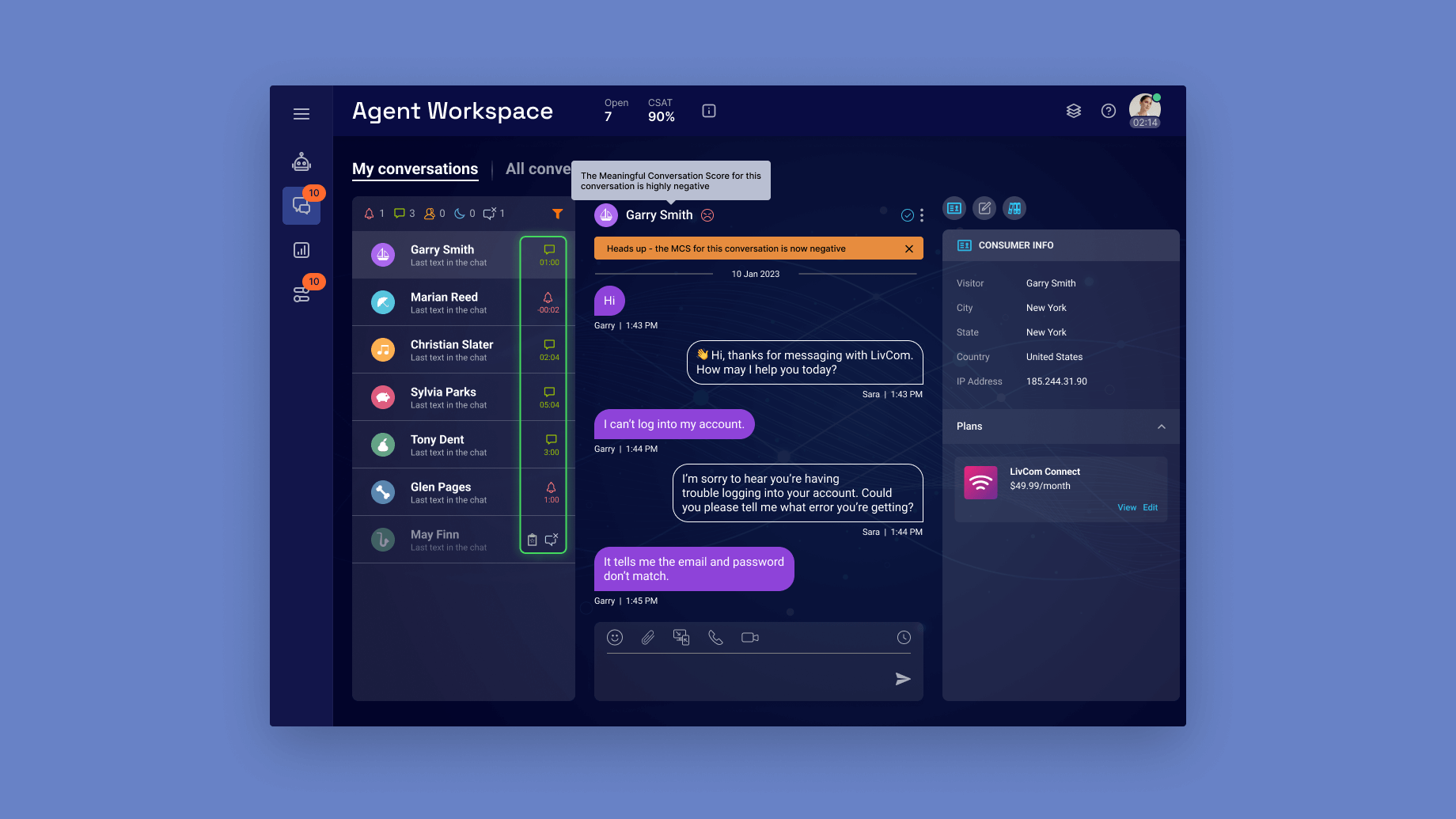
LivePerson: Conversational Cloud AI chatbots for website customer support
Conversational Cloud AI Chatbots for Support
Check different specialized analysis of this solution
Currently viewing:
Conversational Cloud AI chatbots for website customer support
LivePerson delivers enterprise-grade conversational AI that transforms customer support through intelligent automation and human-AI collaboration. The platform processes substantial monthly interactions across messaging, voice, and digital channels, combining natural language processing with real-time sentiment analysis to optimize customer engagement outcomes[2][15].
Market Position & Maturity
Market Standing
LivePerson has established itself as a Strong Performer in Forrester's Conversational AI for Customer Service Wave, scoring highest possible marks in omnichannel capabilities, bot management, and business insights[18].
Company Maturity
The company's market maturity is evidenced by its ability to process substantial monthly interactions across global enterprise deployments, with documented implementations spanning banking, insurance, retail, and telecommunications sectors[2][15].
Industry Recognition
Industry recognition validates LivePerson's market standing through independent analyst assessments. The platform achieved Strong Performer status in Forrester's Conversational AI for Customer Service Wave (Q2 2024), scoring highest possible marks in omnichannel capabilities, bot management, and business insights[18].
Strategic Partnerships
Strategic partnerships enhance market positioning through implementation expertise, with partners like BAB in Saudi Arabia receiving customer praise for local deployment support[15][19].
Longevity Assessment
Longevity assessment suggests strong market position through continued analyst recognition, substantial customer deployments, and documented enterprise renewals. The platform's focus on regulated industries—where switching costs are high and compliance requirements create barriers to entry—provides competitive moats that support long-term market position.
Proof of Capabilities
Customer Evidence
Zurich UK Insurance achieved 222% YoY digital engagement growth with 86% CSAT using voice-to-messaging deflection and hybrid AI-human support workflows[15].
Quantified Outcomes
Documented customer results include 20% higher customer satisfaction scores, 50% reduction in agent attrition, and high automation containment rates across enterprise deployments[2][15].
Case Study Analysis
Banking sector validation emerges through Frost Bank's deployment, which reduced response times to under 60 seconds while maintaining 91% customer satisfaction through AI-assisted agent responses[15].
Market Validation
Global scale evidence includes a Middle Eastern betting platform that contained 58% of customer inquiries via AI chatbots, digitizing 70% of Kenyan market interactions[15].
Competitive Wins
Competitive displacement is evidenced through substantial enterprise implementations. Klarna's virtual assistant handles 2.3 million monthly conversations—equivalent to 700 full-time agents—while Bank of America's Erica maintains 56 million monthly engagements with error rates three times lower than human agents[13][12].
Reference Customers
Bank of America's Erica maintains 56 million monthly engagements on LivePerson's infrastructure, while Klarna's virtual assistant handles 2.3 million conversations monthly—equivalent to 700 full-time agents[12][13].
AI Technology
LivePerson's AI engine leverages proprietary natural language processing models trained on extensive conversation datasets, enabling contextual understanding that processes consumer intent, sentiment, and behavioral patterns in real-time[2][6].
Architecture
The architecture operates through LivePerson Functions—a serverless customization environment allowing brands to integrate APIs with CRMs, payment systems, and legacy databases without hosting overhead[4].
Primary Competitors
Primary competitors include IBM watsonx and Zendesk AI for enterprise conversational AI, with specialized alternatives like Botpress for multilingual flexibility and Intercom for e-commerce optimization[17][19].
Competitive Advantages
Competitive advantages center on three proprietary technologies: Dynamic Capacity Algorithm enabling agents to manage up to 40 simultaneous conversations, Conversation Assist providing real-time AI co-pilot recommendations, and Conversation Context Service storing contextual data across bot and human interactions[1][17][3].
Market Positioning
Enterprise positioning distinguishes LivePerson from broader CRM platforms through deeper conversation analytics and voice-to-messaging deflection capabilities.
Win/Loss Scenarios
Win scenarios favor LivePerson for enterprises in regulated industries requiring sophisticated AI-human hybrid workflows, particularly organizations processing substantial monthly conversation volumes where the platform's advanced capabilities justify implementation complexity. Loss scenarios typically involve SMBs prioritizing rapid deployment over sophisticated features, or organizations lacking technical resources for complex integration requirements.
Key Features

Pros & Cons
Use Cases
Integrations
Featured In Articles
Explore AI chatbots for websites to enhance customer support with our comprehensive buyer's guide.
How We Researched This Guide
About This Guide: This comprehensive analysis is based on extensive competitive intelligence and real-world implementation data from leading AI vendors. StayModern updates this guide quarterly to reflect market developments and vendor performance changes.
20+ verified sources per analysis including official documentation, customer reviews, analyst reports, and industry publications.
- • Vendor documentation & whitepapers
- • Customer testimonials & case studies
- • Third-party analyst assessments
- • Industry benchmarking reports
Standardized assessment framework across 8 key dimensions for objective comparison.
- • Technology capabilities & architecture
- • Market position & customer evidence
- • Implementation experience & support
- • Pricing value & competitive position
Research is refreshed every 90 days to capture market changes and new vendor capabilities.
- • New product releases & features
- • Market positioning changes
- • Customer feedback integration
- • Competitive landscape shifts
Every claim is source-linked with direct citations to original materials for verification.
- • Clickable citation links
- • Original source attribution
- • Date stamps for currency
- • Quality score validation
Analysis follows systematic research protocols with consistent evaluation frameworks.
- • Standardized assessment criteria
- • Multi-source verification process
- • Consistent evaluation methodology
- • Quality assurance protocols
Buyer-focused analysis with transparent methodology and factual accuracy commitment.
- • Objective comparative analysis
- • Transparent research methodology
- • Factual accuracy commitment
- • Continuous quality improvement
Quality Commitment: If you find any inaccuracies in our analysis on this page, please contact us at research@staymodern.ai. We're committed to maintaining the highest standards of research integrity and will investigate and correct any issues promptly.